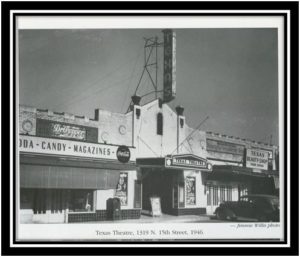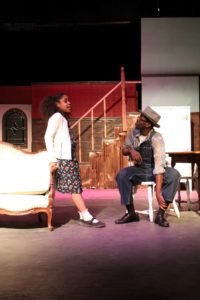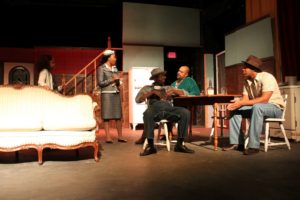(This post is one in a series on race titled “But Some of Us Are Brave.” The series includes posts from a diverse group of writers from our community. It takes a considerable amount of transparency and vulnerability for the contributors to this series to pen these posts and voice their experiences. We appreciate their courage, and we hope their willingness to be brave will spark some authentic community conversation on this sensitive and important topic. We hope you will read these posts thoughtfully and join the conversation by responding honestly and respectfully, and by sharing them with your friends and acquaintances. — ABT )
Rethinking Racism
By Baltazar Acevedo y Arispe, Jr.
And here we go again. Ferguson and its aftermath have sparked renewed interest, debate and introspection of how we Americans act against each other in a destructive manner.
The president is anguished and demonstrates his consternation by appointing another taskforce to solve the problems that are rooted beyond the grasp of Washington. Yes, $75 million will solve all ills. Local political leaders waver and walk the fence in distress, as they are afraid to address this most volatile issue. As a nation we again look at the aftermath of the Civil Rights Era and find that not much has really changed. The only change is that racism is now practiced in more subtle and sophisticated ways.
By every measure of social advancement, the poor have become poorer, the homeless remain without a home, and the illiterate have become more illiterate, the economic and politically disenfranchised remain so. Women continue to suffer neglect, not only in abusive relationships but also in their economic well being as they continue to earn at least 35 percent less than their male counterparts for the same labor. These are the seed that sow the roots that nurture racism and its exclusionary nature.
Racism, at its core, is about exclusion, pure and simple. It is about leaders who are afraid to come face-to-face with the shifting demographics and the fact that ethnic America is just over the horizon. As one who was involved in the Civil Rights Movement and worked with Cesar Chavez in our struggles to expand the rights of Chicano farm workers, I know racism. I see it daily; it has its own scent and its own taste and it can be touched as it meanders within communities, its school districts, civic organizations, its congregations and its institutions of higher education. It has become so pervasive that it permeates the actions of policy brokers who fail to see it or simply ignore it as they continue with their disenfranchisement of those at the lower rungs of the social ladder. I also see its aftermath in the homeless shelters, food banks, its community kitchens, centers for abused women and community based agencies that work daily to stem the tide of poverty and the sense of hopelessness of those that wander the streets searching for a lost future.
As Bob Dylan’s lyrics remind us, “you do not need a weatherman to tell which way the wind the blows.” The wind still blows with the essence of racism and once in a while the tip of the volcano explodes and the lava flows with the hatred and frustration as a response to oppression and threatens our comfort zone.
So what is it that I have learned about racism? I have learned that:
- It is not about hatred or purposeful malice.
- It is not about you, me and them hating others because of their skin color, ethnicity or gender.
- It is not about your willingness to destroy me or my will to do the same to you.
- It is about ignorance and misinformation by one group or an individual about another.
- It is about fear of those in “power” that those without control and influence will attempt to diminish the role of the power brokers.
- It is about an unwillingness to share the means to bring about change in a shared community.
- It is about a willingness to exclude those that are different, who speak differently, have a national origin that is seen as threatening, who have a different religious affiliation, and who have a sexual orientation that may be seen as abhorrent and who view the world through different lenses.
- It is about having a feeling that someone is a threat to whatever social status quo one has and wishes to keep.
- It is about a misguided perception that a self ordained or self-appointed cadre of leaders can “empower” the less fortunate.
- It is about an unwillingness to become informed about the “others.”
- It is about a failure to realize that when the boat sinks that we will all surely drown unless we all work to fix the leaks in the social infrastructure.
- It is about hubris and a belief by a select few that they know what is best for the rest of us.
- It is about not doing the right thing and subscribing to the principles of omission and commission to guide exclusionary public policies and their corresponding practices of neglect.
- All politics is local and so is racism. If we cannot resolve our differences in the compressed geographic space that we share then how can we propose to affect change on a regional, national or global scale?
So the question is this: Is your or my community living near the volcano that is spewing the fire and lava of oppression, frustration or isolation that will one day erupt as it did in Ferguson? Most importantly, what will be the match that lights the next powder keg? The challenge is for us to go beyond dialogue and to assertively take on measures to be more inclusive and to commit to a system of shared accountability for our development as communities that can work together toward to becoming vested stakeholders in a common future. The option of not doing so is rather evident; it comes full-blown into our living rooms on CNN and on our smart phones. Wanton destruction only serves to pollinate the soil for the next harvest of hatred and racism.
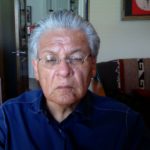 Baltazar Acevedo y Arispe, Jr., Ph.D. is a Chicano activist who spent 45 years at all levels of education. He left the University of Texas System in 2012 as a tenured professor of leadership and research. He resides in New Mexico and Waco, Texas.
Baltazar Acevedo y Arispe, Jr., Ph.D. is a Chicano activist who spent 45 years at all levels of education. He left the University of Texas System in 2012 as a tenured professor of leadership and research. He resides in New Mexico and Waco, Texas.
By Dani Miller
My roommate recently said that she was thankful for this city – Waco – where she has been stretched, shaped, affirmed, and renewed. Her words echo my own feelings about Waco. I have become rooted in this community through school and work. During my time here I have completed my Masters programs. School has definitely been a part of my being stretched, shaped, affirmed, and renewed. The jobs I have worked have contributed heavily as well.
While in school I had a few part time jobs. Two of them were with the Family Abuse Center (FAC), a shelter that offers an array of services for victims of domestic violence. First I worked at the FAC thrift store, Second Chance. Then I moved to the shelter where I worked as a Resident Advocate. Since graduation I have been employed full time as the Volunteer Coordinator and Community Educator.
As I have worked in these different capacities at the FAC I have most definitely been stretched. I have become more aware of an issue that I did not fully understand before. The clients with whom I have worked have had a tremendous impact on me. They have shaped me.
In my work, I get to witness people coming to the realization that domestic violence is a very real issue in our community. The Texas Council of Family Violence releases a report every year to honor and remember the victims we have lost due to domestic violence in the state of Texas. In 2013, 119 women died due to domestic violence, more specifically intimate partner violence.
I have come to realize that domestic violence affects not only those who are directly abused, but also witnesses, family members, co-workers, friends, law enforcement officers and our communities at large.
I have also learned that, though domestic violence has gained more attention in the national news spotlight recently, it is a taboo subject, not openly talked about. This taboo is a barrier that sometimes stops people from seeking the help they need and deserve. How can we continue to break down these barriers in our society?
Survivors who come forward to seek services with us at FAC are brave. They come because they realize they are not safe, or their children are not safe, and because they realize they deserve love, care, and respect in relationships. These realizations may take a long time to take root and grow, but over time they can allow a survivor to break free from the past hurt, pain, and damage caused by abuse.
When we talk openly about domestic violence and acknowledge its existence in our community, that helps us become safe people to talk to about these issues. Our friends and family can open up to us. That in itself is progress and a victory. Of course our ultimate goal is for those in abusive relationships to become free and to live lives free of violence, but we also appreciate small victories, such as when someone feels safe enough to speak out.
Last fall I was at a resource fair representing the FAC. There were many people around, but one young woman walked by me slowly. She made eye contact and whispered, “Hi, I used y’all’s services, and I am not in that relationship anymore. I am so happy.” She gave me two thumbs up. Our confidentiality policy makes it clear that if a former client chooses not to engage in public we do the same. It is their right to keep their information or any connection with us confidential. So, given the situation, I did what I could without breaching confidentiality — I returned her joyous smile.
Those of us who work at the Family Abuse Center, whether for pay or as volunteers, are a part of all of this. Together, we rejoice for those who survive – and remember and honor those we have lost.
Just as I have been stretched and shaped in Waco, I have also been affirmed and renewed. I have observed through our staff, our clients, and our volunteers that this community is beloved and that it can rise above the reality of violence. This community will see the pattern of abusive and hurtful behavior and will listen when a victim decides to speak out. Love and compassion can break the cycle of violence. Love and compassion can be exhibited through patience, through empathy, and through caring.
Domestic violence is a topic that is difficult for some of us to understand, but there is assistance and hope. How can we engage in this issue? We can engage with patience, empathy, and caring. We can share the knowledge that services provided by The Family Abuse Center and numerous service providers across the state are available to survivors. The professionals in these organizations stand alongside volunteers. We join together to recognize and cheer on the survivors, and also to mourn, honor, and remember those we have lost. This prayer is for them:
For those
who walked with us
this is a prayer.
For those
who have gone ahead,
this is a blessing.
For those
who touched and tended us,
who lingered with us
while they lived,
this is a thanksgiving.
For those
who journey still with us
in the shadows of awareness,
in the crevices of memory,
in the landscape of our dreams,
this is a benediction.
~ Jan Richardson
Source: In Wisdom’s Path
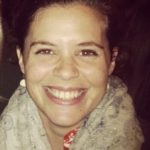 This Act Locally Waco blog post was written by Dani Miller. Dani is a four and a half year Waco resident who works as the Volunteer Coordinator/ Community Educator at the Family Abuse Center. She recently earned her Masters of Social Work at Baylor University and Masters of Divinity at Truett Theological Seminary. If you want to know more about volunteering or about the Family Abuse Center, contact her at [email protected].
This Act Locally Waco blog post was written by Dani Miller. Dani is a four and a half year Waco resident who works as the Volunteer Coordinator/ Community Educator at the Family Abuse Center. She recently earned her Masters of Social Work at Baylor University and Masters of Divinity at Truett Theological Seminary. If you want to know more about volunteering or about the Family Abuse Center, contact her at [email protected].
The Act Locally Waco blog publishes posts with a connection to these aspirations for Waco. If you are interested in writing for the Act Locally Waco Blog, please email [email protected] for more information.
(This post is one in a series on race titled “But Some of Us Are Brave.” The series includes posts from a diverse group of writers from our community. It takes a considerable amount of transparency and vulnerability for the contributors to this series to pen these posts and voice their experiences. We appreciate their courage, and we hope their willingness to be brave will spark some authentic community conversation on this sensitive and important topic. We hope you will read these posts thoughtfully and join the conversation by responding honestly and respectfully, and by sharing them with your friends and acquaintances. — ABT )
A Movement towards Color-Sightedness
My name is Amber Jekot and I’m a recovering racist. I say recovering because I confess that I have not arrived. I say recovering because I’m working towards becoming more conscious of an experience that is not, nor will ever be my own. I both admit and commit to the ongoing journey towards race consciousness, a journey that, like Lucas Land and Kelsey Miller before rightly articulated, begins with submitting myself to the position of a student. I am indebted to the friends, professors, and community members of color who have been patient enough to teach me, a patience that must have, at times, been painful.
I know something of being misunderstood, just as everyone does. Being misunderstood, misrepresented, victim to false assumptions. Yes, these are experiences common to us all, and I don’t know about you, but I can’t stand being misrepresented. I am careful to articulate my words so that my intentions are communicated in such a way that others can understand. I present myself professionally because, let’s be honest, my size isn’t proportional to my age. I choose prudently those with whom I share my pain because there is nothing worse than baring your heart to someone who doesn’t validate your experience. I can remember the emotions evoked during such times, blood rushing to my face, exasperation rising in my lungs, and the resulting inability to articulate a retort due to the magnitude of my frustration: “How can you discount something just because it was not your experience?”
Well, the things that bother us most about other people generally have their basis in what we lack within ourselves, a frustrating reality indeed. One of the lessons I have learned in my personal journey toward becoming more conscious of racism was the debunking of the colorblind myth, a lesson for which I have Dr. Sanders to thank.
Dr. Sanders, a black man whose height can only be described as tremendous, came to talk to a group of students, myself included, whose understanding of race was as small as our comparative statures. Dr. Sanders shared that while generally well-meaning, the following and often-used statement is offensive to him: “I don’t see you as a black man, I just see you as a man.” Upon first glance, perhaps this statement does seem innocent. It did for me. I scooted up in my chair with curiosity, and quizzically listened as Dr. Sanders continued: “That statement is a ridiculous as you saying to me, Alvin, I don’t see you as a tall man, I just see you as a man.” He paused, giving us the time to take in his height, and then he continued, “Are you all seriously going to tell me that you don’t see my height?”
 He went on to explain that when people choose to not see color, it often feels like people are also choosing to not see the effects that racism has on people of color. There is something about largeness that people are comfortable with; there is something about blackness that causes us to pause. Our culture doesn’t claim mottos such as size-blindedness, but claims colorblindness, a reality that divulges a discomfort implicit in the mention of race.
He went on to explain that when people choose to not see color, it often feels like people are also choosing to not see the effects that racism has on people of color. There is something about largeness that people are comfortable with; there is something about blackness that causes us to pause. Our culture doesn’t claim mottos such as size-blindedness, but claims colorblindness, a reality that divulges a discomfort implicit in the mention of race.
In claiming colorblindness it often seems that we are neglecting to acknowledge the impact of color, neglecting to acknowledge realties such as these:
People of color are overrepresented in the US penal system for illicit drug use despite the fact that “Data on illicit drug use collected by the Health and Human Services Commission has consistently shown over time that whites, African Americans, and Latinos use drugs at roughly comparable rates” (Mauer & McCalmont, 2013, p. 6; Stevenson, 2014; Alexander, 2011).
According to the CDC, “The infant mortality rate among African Americans is 2.3 times that of non-Hispanic whites.” Additionally, African American infants are 4 times more likely than non-Hispanic white infants to die due to complications related to low birthweight.”
Perhaps such a reality feels too heavy to hold. Perhaps colorblindness is our way of saying “this can’t be so”— well meaning but vision-impaired.
When I read books like Just Mercy or the New Jim Crow, books that detail breaches of justice in the US penal system, I find myself having to put these books down because the reality feels like “too much” for the present moment. When I find myself overwhelmed by stories my friends of color share with me about implicit or explicit racism, I have to “escape” from my thoughts because I can’t imagine that anyone could treat my friends with such disdain. The pain, which feels overwhelming for me, is something that I, as a white, middleclass woman, can choose to pick up and put down, to look at or keep my eyes closed. That is privilege.
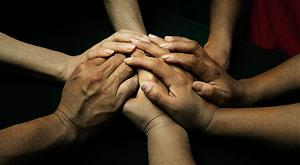 Perhaps those who are the most brave are the men and women of color who have boldly continued to share their experiences despite my own and others invalidating responses. To you, the brave, please keep speaking. The journey of the color-blind and color-sighted are indebted to your vulnerability. To those who are on the journey, however far along you are, or if perhaps you’re ready to begin the journey: let’s commit together. Instead of falling prey to white guilt, let us instead capitalize on this energy and direct it towards forward momentum. Let us speak alongside our brothers and sisters of color because this burden becomes lighter when we see and speak together. Solidarity, a good friend recently shared, means that no one or no group should have to stand alone.
Perhaps those who are the most brave are the men and women of color who have boldly continued to share their experiences despite my own and others invalidating responses. To you, the brave, please keep speaking. The journey of the color-blind and color-sighted are indebted to your vulnerability. To those who are on the journey, however far along you are, or if perhaps you’re ready to begin the journey: let’s commit together. Instead of falling prey to white guilt, let us instead capitalize on this energy and direct it towards forward momentum. Let us speak alongside our brothers and sisters of color because this burden becomes lighter when we see and speak together. Solidarity, a good friend recently shared, means that no one or no group should have to stand alone.
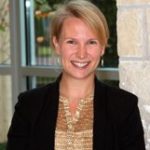 Today’s Act Locally Waco blog post is by Amber Jekot. Amber is an 8-year Waco resident who works as a graduate assistant at the Texas Hunger Initiative. She is finishing a masters of social work at Baylor University and a masters of divinity at Truett Seminary. She is passionate about the intersection between food, justice, and community and has been known to take trains without knowing her destination. You may contact her via email at [email protected].
Today’s Act Locally Waco blog post is by Amber Jekot. Amber is an 8-year Waco resident who works as a graduate assistant at the Texas Hunger Initiative. She is finishing a masters of social work at Baylor University and a masters of divinity at Truett Seminary. She is passionate about the intersection between food, justice, and community and has been known to take trains without knowing her destination. You may contact her via email at [email protected].
Sources:
Alexander, M. (2011). The new Jim Crow: mass incarceration in the age of colorblindness (revised ed., p. 1). New York: New Press.
Fact Sheet: Health Disparities in Health Insurance Coverage. (2011). Retrieved from http://www.cdc.gov/minorityhealth/reports/CHDIR11/FactSheets/Insurance.pdf
Mauer, M., & McCalmont, V. (2013). A Lifetime of Punishment: The Impact of the Felony Drug Ban on Welfare Benefits. Retrieved from http://sentencingproject.org/doc/publicationscc_A%20Lifetime%20Punishment.pdf
Stevenson, B. (2014). Just mercy: a story of justice and redemption (p. 1). New York: Spiegel & Grau.
By Emily Mills
We were made to carry fire. All of us have been infused with passions and purposes that set us ablaze. We lose something when our fire is low. As it smolders and simmers, producing nothing but smoke, we become deflated.
Fire is purpose, the expression of God’s working presence.
In Numbers 9, God sends holy fire to light the way for His wandering children. This fire wasn’t merely a blazing night light, but a literal sign of the presence of God. Today, we taste that fire through the Holy Spirit. We are lit from the inside out to carry the fullness of God in our finite mortal bodies. And so, your life becomes a wild torch, burning and blazing wherever you go.
12 years ago, I began going on strip club outreaches, an expression of this unique fire burning inside of me. I had no clue it would change the entire course of my life. Through this small step, our ministry Jesus Said Love was born. Years later, we are getting ready to launch into a pioneer phase of programs at our new building at 1500 Columbus! In order to fit our needs, the building needs major renovations (to the tune of $100k). While we could do the usual “ask” (private meetings with large donors and foundations), we wanted something more. Because this building means the presence of JSL within our community, we wondered how we could invite the community into the process.
About a year ago, I was driving through downtown and “prayer-storming” (a mashup brainstorming and prayer), wondering what was God doing through our little city.
Where were we headed?
What did JSL have to do with any of it?
Why had God kept Brett and I in Waco so long?
What kind of experience could we give the community to share the vision of JSL?
And there she was… the bankrupt, beat-up, old, abandoned theatre. The Hippodrome had as much history and mercy as we did. We soon spoke with Shane Turner (the man behind the incredible reemergence of the Hippodrome theater), and I shared with him the story of JSL. We agreed that the Hippodrome would be the perfect place for us to host an event. And so the fire was stoked.
 Through a series of crazy pieces falling together beautifully in unexplainable ways, we have created an event that some might call a gala…but really, it will be so much more. Wild Torch will be an experience. The usual gala usually goes something like this: mediocre food, an underrealized venue, awkward networking conversations, and a rambling speaker. Guests walk away with empty pockets in hopes that it makes a dent of a difference.
Through a series of crazy pieces falling together beautifully in unexplainable ways, we have created an event that some might call a gala…but really, it will be so much more. Wild Torch will be an experience. The usual gala usually goes something like this: mediocre food, an underrealized venue, awkward networking conversations, and a rambling speaker. Guests walk away with empty pockets in hopes that it makes a dent of a difference.
Our desire is to turn this notion upside down. What if you actually got more than you gave? What if coming to a faith-based nonprofit gala meant an incredible experience? What if YOU left inspired? What if your voice was heard and your fire was lit? What if instead of being sought after for money, you were sought after for your voice, your participation? It may sound ambitious, but we’re looking to do more than raise $100K. We’re looking to change the culture of our community.
We desire to do this through every form of art we have access to: music, painting, pottery, film, dance, and drama. Upon arriving, you will watch Jonathan Martin (potter) and Cash Teague (painter) create live pieces to be auctioned off that night. In the dining area of the Hippodrome, a community exhibit of Kermit Oliver’s Herme’s scarf collection will be on display as guests enjoy small bites and sips. Table sponsors will enjoy a three course meal of upscale soul food crafted by Chef Corey McEntyre as they are serenaded by the storytelling songs of the Union Revival. Tony award nominee and Baylor alumni Elizabeth A. Davis will be performing an original drama; Out on a Limb and Baylor Dance Company will perform movement; filmmaker Chris Hansen will showcase the story of one of our women. The night will end with Brett and Emily Mills and full band, heralding the crowd toward redemption. Our songs hold the voices of the women we have reached and a message we believe can change culture.
Won’t you come and carry the Wild Torch with us? This incredible event will be on March 23rd at the Hippodrome, Waco, TX. Information on sponsorships and tickets available at www.wildtorch.com
Holding fire,
Emily Mills
Founder of Jesus Said Love
 This Act Locally Waco blog post was written by Emily Mills. Emily is the founder and Co-CEO (with husband Brett Mills) of Jesus Said Love, a ministry dedicated to awakening hope and empowering change for women in the commercial sex industry. Emily and Brett live in Waco, TX with their three awesome children Hattie, Lucy, and Gus. To learn more about Wild Torch, visit wildtorch.com or our website JesusSaidLove.com. Contact us at [email protected].
This Act Locally Waco blog post was written by Emily Mills. Emily is the founder and Co-CEO (with husband Brett Mills) of Jesus Said Love, a ministry dedicated to awakening hope and empowering change for women in the commercial sex industry. Emily and Brett live in Waco, TX with their three awesome children Hattie, Lucy, and Gus. To learn more about Wild Torch, visit wildtorch.com or our website JesusSaidLove.com. Contact us at [email protected].
The Act Locally Waco blog publishes posts with a connection to these aspirations for Waco. If you are interested in writing for the Act Locally Waco Blog, please email [email protected] for more information.
by Jenuine Poetess
I recently had the opportunity to talk with Khira Hailey, Artistic Director of Mission Waco’s Jubilee Theater and supervisor of “Urban Expressions” in North Waco at the corner of 15th and Colcord. Over gourmet hot cocoas from Dichotomy Coffee & Spirits she shared with me her personal history at, present work with, and vibrant vision for Jubilee Theater. After our conversation, I had the pleasure of attending Hailey’s production of A Woman Called Truth in remembrance and celebration of Black History Month.
From her earliest years, Hailey recalls having an insatiable hunger for theater arts, yet lack of programming in her later elementary and middle school years left her without any outlet for her theater arts creativity. In high school her passion was rekindled by a teacher, Von Gretchen Shepherd, who ignited Hailey’s spark and provided opportunity and direction. After high school, Hailey attended the University of North Texas where she studied Radio, Television, and Film and participated in such groups as Poetic Justice and CAST. The founder of CAST was a Wacoan who initially revived the Jubilee Theater under Mission Waco’s wing in 1995 until his departure in 2012 at which point he called upon Hailey to take the baton and continue shaping the theater arts programming at Jubilee Theater.
In an area with a sordid history, Mission Waco’s Jubilee Theater thrives into its name by offering replenishing respite and redemption while revitalizing a struggling neighborhood. Poverty is not a simple matter of lack of money, poverty occurs when individuals and communities are sapped of resilience, resources, and outlets for creative and cultural expression. When agency is removed and voices are silenced — poverty is a symptom. In the heart of an area of Waco which had been long stripped bare of identity, vibrancy, and thriving, Jubilee Theater has grown into an oasis cultivating and resuscitating a pulsing life into its neighborhood.
Through after school programming, Hailey empowers students in Mission Waco’s theater arts classes to learn and strengthen verbal communication skills, acting techniques, emotion expression, reading and literacy, courage and confidence and the ability to carry and present themselves publicly. In addition to after school opportunities there is an annual musical production open to young actors and theater artists in 3rd- 8th grades and a summer theater camp experience.
Not just for youth, Jubilee Theater presents three to four performances a year with auditions open to all community members. Jubilee kicked off 2015 with several showings of A Woman Called Truth: the story of Sojourner Truth. On February 15th, Waco Civic Theater will be performing their show, Crowns, at Jubilee Theater as a benefit fund-raiser for both Jubilee Theater and the Doris Miller Memorial. Coming up in March, the theater presents its annual youth musical, on the stage this year, Alice in Wonderland. Wrapping up the season will be a production of Amen Corner, a gospel musical open to actors of all ages coming in April.
 Khira Hailey is a woman of many talents and powerful vision. She has exciting hopes and plans for the future of the theater and its programming—we even cooked up ideas for collaborations with Waco Poets Society & poetry/spoken-word events! Hailey is continuing to strengthen relationships with community members to grow and enrich the after school program offerings, to increase funding for the theater to bring a riveting selection of shows in 2016 and beyond, and to have consistently abundant attendance at Jubilee productions.
Khira Hailey is a woman of many talents and powerful vision. She has exciting hopes and plans for the future of the theater and its programming—we even cooked up ideas for collaborations with Waco Poets Society & poetry/spoken-word events! Hailey is continuing to strengthen relationships with community members to grow and enrich the after school program offerings, to increase funding for the theater to bring a riveting selection of shows in 2016 and beyond, and to have consistently abundant attendance at Jubilee productions.
One of the concerns Hailey has had during her tenure at Jubilee Theater is shifting the perceptions of the greater Waco community regarding the North Waco area. Because of its coarse past, she says many folks shy away from seeing the theater’s productions and attendance and ticket sales have suffered as a result. In reality, the area is safe and returning to thriving. Hailey shared that it is most discouraging to know how much time, energy, talent, and passion goes into each production, poured out of every person involved from actors, producers, directors, to costume design, stage craft, lighting, and sound, only to have handfuls of people show up in support. Waco is rich with extraordinarily talented artists across every age, gender, ethnicity, experience, belief, culture, and identity. Our community misses out on the benefits of such wealth when we don’t show up to be present for our neighbors, friends, and leaders who are transforming our city one creative expression at a time.
I loved my time with Khira Hailey and left our conversation inspired and excited to share her work with Waco. Hailey is motivated in her work by watching others flourishing in their craft—be it theater, poetry/spoken-word, visual arts, dance, performance; she is nourished by the mentoring of others in her field, and is deeply passionate about holding space for others to become themselves through the creative process, from audition to final curtain!
Get Involved:
- To purchase tickets for upcoming shows or to find out information about renting the theater for a special event please visit Jubilee Theater online.
- To make a donation to the theater and/or after school youth programs, please visit Mission Waco’s donation page and complete your transaction via secure credit/debit card (be sure to note in the comments that you want your contribution to go toward Jubilee Theater programming).
- If you would like to contribute your time and talents in any of the following ways, please call or text Khira Hailey at (469) 471-1969
- Auditioning for an upcoming show, or leading a workshop in the after school program (looking for volunteers who can make a semester or school-year commitment 1 afternoon a week in any of the following categories: Theater, Speech & Debate, Dance, Fine Arts, other creative disciplines)
- LIKE and SHARE the Mission Waco Jubilee Theater Facebook page to stay tuned about the rich array of events throughout the year. Information about the youth summer theater camp will be rolling out in March/April 2015.
- Save the date to come hear Khira Hailey perform as featured artist at Waco Poets Society’s Nuestra Voz open mic on Saturday March 28, 2015, 7pm, in celebration of Womyn’s Herstory Month.
 Jenuine Poetess is an artist, visionary, and community organizer. In 2010, she founded In the Words of Womyn (ITWOW), an international, grass-roots, written and spoken-word arts project with chapters throughout Los Angeles; Waco, TX; and Lebanon. ITWOW empowers womyn of all ages to give sound to our story and volume to our voice.HOT~ITWOW writing circle meets Mondays from 6-7:45pm at the Art Forum of Waco beginning February 2, 2015. Jenuine also founded Waco Poets Society which sponsors a local open mic venue in Sanger Heights. Meeting every 2nd & 4th Saturday at the Art Forum of Waco Nuestra Voz Open Mic invites community to share poems, songs, stories, spoken-word, and other creative expressions! In 2015, Jenuine along with a number of other artists creating and residing in Waco, co-founded the Central Texas Artist Collective (click link to learn more and get involved). You can contact her at: [email protected].
Jenuine Poetess is an artist, visionary, and community organizer. In 2010, she founded In the Words of Womyn (ITWOW), an international, grass-roots, written and spoken-word arts project with chapters throughout Los Angeles; Waco, TX; and Lebanon. ITWOW empowers womyn of all ages to give sound to our story and volume to our voice.HOT~ITWOW writing circle meets Mondays from 6-7:45pm at the Art Forum of Waco beginning February 2, 2015. Jenuine also founded Waco Poets Society which sponsors a local open mic venue in Sanger Heights. Meeting every 2nd & 4th Saturday at the Art Forum of Waco Nuestra Voz Open Mic invites community to share poems, songs, stories, spoken-word, and other creative expressions! In 2015, Jenuine along with a number of other artists creating and residing in Waco, co-founded the Central Texas Artist Collective (click link to learn more and get involved). You can contact her at: [email protected].
(This post is one in a series on race titled “But Some of Us Are Brave.” The series includes posts from a diverse group of writers from our community. It takes a considerable amount of transparency and vulnerability for the contributors to this series to pen these posts and voice their experiences. We appreciate their courage, and we hope their willingness to be brave will spark some authentic community conversation on this sensitive and important topic. We hope you will read these posts thoughtfully and join the conversation by responding honestly and respectfully, and by sharing them with your friends and acquaintances. — ABT )
Dear Fear,
Normally I start a letter by asking how you are, but I don’t much care to ask how you are doing. Instead, I’ll get right to it: you’re really wreaking havoc in our communities and I’d like to see it stopped.
You are a bully. You like to push and prod. You coax us to think the worst about people, exaggerate stereotypes. A drop in the stomach when I see that man, that black man walking toward me. Fear, you urge us on.
Fear, you are not new to this job. No, your tactics were employed long ago to strip people of their identity, their pride, and their dignity. Slavery, Jim Crow, Segregation– I smell your stench in them all.
Your tactics have evolved. Even now, people are paralyzed from speaking or sharing because of you. Their words mangled and strangled because of your tight, tight grip.
Fear, you are not an excuse or cop out. We cannot blame you for the hate and enmity that exists between peoples. But you do cause us to pull away instead of drawing near to each other, which disables us from seeing the Beloved Community realized. We are then blind to the reality and beauty of each individual and the collective.
When we give you power, we allow you to destroy whole groups of people. Fear, you are no friend of mine.
But I know your secret. I know you flee at the first flicker of unity. You shrink back at the sight of common understanding. You groan under the weight of triumphant justice. And so, it’s really clear isn’t it? We can be victorious over you.
I’m saying goodbye. I have no time for you. You’ve ravaged too long the streets of Waco, the hearts of men and women, the dreams of little brown boys and girls.
I am a fool no longer.
I am joining hands with my sisters and brothers to dispel you. It takes more than some of us to be brave, I know that well. We need everyone to be brave so that our communities can be full of beautiful color and song again. We need to be brave so we can build and rebuild bridges long burned down.
Don’t bother looking for me again, fear, because I’ll be too busy walking free, hand in hand with my beloved community, working toward justice, peace and wholeness. And frankly, you’re not invited.
Most sincerely,
Alexis
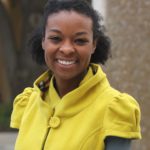 Alexis Christensen is a Community Organizer at Waco Community Development Corporation (Waco CDC).
Alexis Christensen is a Community Organizer at Waco Community Development Corporation (Waco CDC).
by Liz Ligawa
I was sitting in my doctor’s office as I awaited my time to be seen. The “things to do” from our last visit scrolled through my head, ready to spill out as soon as she walked in: Decrease sodium intake. Increase physical activity. Limit processed foods. Take time to rest. These were not unkind recommendations. In fact, this wise counsel was offered to me by one of the most generous souls in medicine I know. But I still had not done it. So, I decided to keep quiet about the list- silently hoping she would not notice. Though she kindly observed my silence, she allowed her instruments to reveal the truth.
Over the last six months or so, I have been listening for, and to our community concerning the safety of Americans of African descent in relation to police. The dialogue and inquiry which has pulsed through communities across our country seems to have found censure in Waco. Is there something different about Waco that would make these conversations unnecessary? Is Waco a unique community which is immune to the ills suffered by Ferguson, MO or New York? Why is Waco so silent?
Before I continue, let me be honest. This subject is quite difficult for me. It is not what I originally intended to write about. I even struggled with feelings of inadequacy to engage this topic. However, even as I strongly embraced the urge to keep a safe distance from this truth, I realized that although it does not appeal to my comforts, I must acknowledge its appeal to my conscience. There is much to be heard in silence.
Waco has a history about which she keeps silent. It reminds me of the invisible boundaries we all adhere to in our families. Only a couple of months ago, many of us participated in these waltzes as we navigated the hushed topics of family members during the holidays. We will not discuss David’s drinking even as we grow nervous with each subsequent glass. We do not check in on Miriam and Max’s marriage even as resignation fills their eyes. And it sure would not be polite to mention the miscarriage suffered by Destiny and Deleon; they still have little Suzy anyway…right? Silence protects our secrets.
Jesse Washington is one of Waco’s secrets. Its own history with Americans of African descent is the reason Waco remains silent.
I was listening to a brief TED talk by an educator named Clint Smith. In his discussion about silence, he takes courageous steps of vulnerability and discloses motives which took their turn in rendering him silent. Smith shared that though he had focused his passion to liberate his students, charging them to not abscond with their truth, he found himself in need of being reminded of the truth: “We spend so much time listening to the things people are saying that we rarely pay attention to the things they don’t: Silence is the residue of fear.”
I wonder how you are dealing with my silence in this article. There are many things I have left unsaid. Up until now, if you did not already know the story about Jesse Washington, there is not much more you know from reading what I have written. Up until now I have not mentioned that he was an African-American farm hand. Up until now, I have not mentioned he was held responsible for the death of an Anglo wife of a cotton farmer in 1916. Up until now, I have not mentioned our McLennan County courthouse…the hanging tree…or what was made of the charred remains of a man not valued by society; not valued by his Waco community. Our silence tells a story.
In the doctor’s office that day, my silence told a story. If Dr. Duchamp would have only attended to my smile, I would have seemed alright. If she would have only paid attention to my put-together presentation, she would have had no concern. If Dr. Duchamp received my silence as an indicator of all things well, my needs would have remained unaddressed and on course for unfortunate events. I am grateful she practiced well when the truth was hard for me to tell.
In the silence I hear in our community, I am trying to decipher what it means. There are steps which have been made with regard to this part of our history, but there are silences still needing to be attended: the silence of apology in the resolution; the silence of Mr. Washington’s name.
Yes, silence tells a story on its own. What story are you telling with yours?
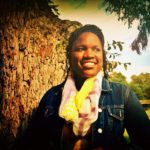 This post was written by Liz Ligawa. Liz is a graduate student of Baylor University where she has found the perfect expression of her community-centered heart in the MDiv/MSW degree program. With a concentration on Community Practice, she is also the adoring mother of one son, Elijah, who prefers to be regarded in public as Spider-Man. She may be reached at [email protected].
This post was written by Liz Ligawa. Liz is a graduate student of Baylor University where she has found the perfect expression of her community-centered heart in the MDiv/MSW degree program. With a concentration on Community Practice, she is also the adoring mother of one son, Elijah, who prefers to be regarded in public as Spider-Man. She may be reached at [email protected].
The Act Locally Waco blog publishes posts with a connection to these aspirations for Waco. If you are interested in writing for the Act Locally Waco Blog, please email [email protected] for more information.
(This post is one in a series on race titled “But Some of Us Are Brave.” The series includes posts from a diverse group of writers from our community. It takes a considerable amount of transparency and vulnerability for the contributors to this series to pen these posts and voice their experiences. We appreciate their courage, and we hope their willingness to be brave will spark some authentic community conversation on this sensitive and important topic. We hope you will read these posts thoughtfully and join the conversation by responding honestly and respectfully, and by sharing them with your friends and acquaintances. — ABT )
by Ruben Salazar
I’ve never been shot at by a cop or chased by sheets-wearing men, but I have been at the receiving end of power-toting bigots. In many ways, I’m also surrounded by an important aspect of racism—white power (known by some as just “white privilege”). People of color will be on to something positive in our city when we can find ways to dilute dominant white power structures. In my opinion, one of the best ways of doing this is by fighting for diversity (not just tokenism) wherever there are seats at the tables of power.
My friend Sonya said something interesting to me one day. She commented about how some of us go through a ‘get back at whitey’ phase. We had been chatting about the lack of racial diversity around Waco. Sonya is a black woman. I felt an immediate bond with her because we shared the same frustration with white power and privilege. By the way, neither Sonya, nor I, nor others we associate want to get back at anyone. To ‘get back at whitey’, used in the way it rolled off Sonya’s tongue, is the desire to change the white power system. (Try reading Howard Zinn’s, A People’s History of the United States, for a benign introduction to white oppression.)
Personal experiences also fuel my desire for change.
For example, I’ve been frisked a few times—for no reason—by white cops for committing minor traffic violations. A white sheriff once flipped me off for no reason when I went to visit a friend at the county jail—I was just 15. And then there was the white highway patrol officer who pulled me over for doing 62 mph on a 60 mph zone. He frisked me, then told me to get into his patrol car’s passenger seat. I asked him if this was protocol. To this, he answered with his heavy twang, “Boy, I do what I want!”
Through the years, I’ve heard white supervisors make comments about how they hate hearing Spanish spoken at work. A white manager once told me that black universities are a form of reverse racism. I’ve been told by white company leadership that Affirmative Action policies only invite unqualified black and Latino personnel who can’t do the work as well as “someone who got the job because they were properly qualified” (i.e., the white person). Two white people, just this past year, boasted to me about their racist actions: one used to shoot his BB gun at blacks walking down the street and the other used to put snakes in the jeeps of black soldiers when he was in the military. Would they admit the same in the face of a black person?
Encounters with racism and white power aren’t always so stark and in your face. For starters, there is a long list of examples of institutionalized racism. Also, there are many white people who exert white power without knowing that they’re doing so. For example, some churches and religious charitable organizations enjoy imposing their power onto non-whites and poorer whites. I used to live in an area in North Waco that is apparently ripe for “community service projects.” I’ve grown accustomed to seeing young white volunteers mow yards and clean up blighted areas for tenants who must be too poor to mow and clean. I know because my yard got mowed once, without my consent, while I was away from the house! That was the day I learned I was poor.
And get this: once, while my wife and I were cleaning our yard, a young white couple walking by stopped and asked us if we were providing “service to the homeowners”! Wow! Who knew people could take care of their own yards?
Can you think what would happen if I—a brown-skinned Mexican—moved to a white upper-class part of town, set up my charity, and began to impose changes on the neighborhood that I thought were needed?
Able-bodied people of color shoot themselves in the foot when they accept having their yards mowed or their houses painted. This acceptance just perpetuates the idea that we need their help. “Never do for someone what they can do for themselves”. Now there’s a motto that, if upheld by everyone, would tear down a large chunk of the white power structure lurking in our communities.
Our society will be a better place when blacks, Latinos, poor whites, and others perceived as needy, do for ourselves, instead of relying on the handouts and freebies from entities designed by whites with power — some of whom turn around and complain about poor peoples’ demands for entitlements. This is an argument for grassroots community organizing amongst minorities, but that’s another story.
It would also help if white (and other) insistent do-gooders could begin to view blacks, Latinos and poorer whites as having strengths and abilities, instead of having deficits and having to aspire to middle class values (e.g., the Ruby Payne framework). My suggestion is that they re-educate themselves and others with white power about how their charitable acts, funds and other support, in many ways, perpetuate the very problems they think they’re trying to eradicate.
People of color should continue the fights of our forefathers and mothers for racial equality. We should continue to demand racially diverse leadership (at all tables of power—community organizations, business, government, education, etc.) that mirrors the diversity of our communities so that we can begin to diminish the historical specter of white power and privilege.
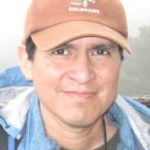 Ruben P. Salazar is a native Wacoan who enjoys learning about history and culture. He is an artist and a do-it-yourselfer around the house. In the very near future he swears he’ll finally self-publish his long overdue book about a local dude people used to call the Maracas Kid. Gardening and being crafty are two things he loves to do with his lovely wife, Rachel.
Ruben P. Salazar is a native Wacoan who enjoys learning about history and culture. He is an artist and a do-it-yourselfer around the house. In the very near future he swears he’ll finally self-publish his long overdue book about a local dude people used to call the Maracas Kid. Gardening and being crafty are two things he loves to do with his lovely wife, Rachel.
by Sophia A. Strother
I struggled with this blog for weeks not really sure what I should discuss given so much that has transpired in my personal life and nationally that has had a profound effect on me. I wondered…should I discuss the dominant news on civil injustices against black men? The national spotlight on domestic violence in the sport and entertainment industry lately? Or my personal experience recently of losing my grandmother who played such a vital role in the woman I am today? So much to talk about and only a short space to do it in…
I finally settled on the life changing experience of deciding to take my grandmother into my household. I became her sole caregiver in January 2012. Millions of people across America have made this same decision, yet there has not been much attention or appreciation regarding the silent journey of heroism that such a decision renders.
Many know my story. I survived sexual abuse at the hands of my father, rape at the age of 14 which led to motherhood for me at 15. I also survived a mother who succumbed to drugs through my adolescence and adulthood. I’ve told this story through my book “Sophia: I’m Back.”
Many also know that my grandmother, Vivienne “Mattie” Strother Adams, was my appointed angel in my life. She took me and my newborn son in when I was 15 and helped to set the foundation of the woman that I am today. It was a no brainer that when she became terminally ill with Vascular Dementia and Congestive Heart Failure I was going to be HER angel by making sure she was well taken care of. So at the height of my career I took in my grandmother, homeless mother and two younger brothers making ours a mighty household of 8….yes, I said 8 … and, I was the ripe old age of 32.
Over two years, as my grandmother’s disease progressed, I resigned from my career with the State of Texas, withdrew from the public, and became lonely and desperate for resources and support. Unfortunately, offers of support were far and few between. If I found a support group it was only held once a month. My grandmother didn’t have Medicaid, so I only received 20 minutes of aid three times a week; everything else had to be paid out of pocket. I realized in that time that caregivers are grossly overlooked. Other people underestimate the grueling emotional toll caring for your loved one has on your own psyche.
I considered myself to be strong and forward thinking, but toward the end of my grandmother’s life this past November I found myself weakened and without purpose. I’m hoping more caregivers find the strength to reach out to one another. I also hope helping organizations realize that once a month isn’t sufficient to give emotional and mental release for caregivers.
I have a new found respect and bond with others that took the same journey as I did through caregiving.
Here are some tips that worked for me:
- Take time daily to step away — Whether it was 30 minutes to sit on the porch, or time to read a book. I had to make time for myself to clear my mind from the daily chores of caregiving.
- Reach out to others when feeling down — I used to feel guilty that I was sad about giving up my career or a large portion of my social life, however, reaching out to friends, former coworkers and community colleagues really helped. They kept me laughing and talking, and allowed me to vent.
- Seek out community resources. — There are several support groups in the community and they work. You need to talk to others who can truly understand. Also you might learn tips or new ways of caring for your loved one.
- Know your limits. — I had to accept I couldn’t physically do everything and it was okay to ask for help. Take advantage of volunteers who are willing to help or low-cost agencies that can also aid.
- Know that YOU ARE A BLESSING! — Even if you don’t get a pat on the back, you are a blessing to your loved one and it’s a blessing to be able to have the heart and means to care for them. Some of our loved ones mentally start to leave us, but try to remember the good times you had with them or how they were there for you and it helps ease you during the rough nights.
Act Locally Waco, thank you for having an outlet for the community to share and connect. I hope if you are in a similar situation and you are reading this that you will realize you’re not alone. Reach out to others for help as you travel through this journey of caregiving. A piece of my soul left me on November 9th, but I wouldn’t trade my experience and journey of caring for my grandmother…all the intimate time I had with her…now that she has gone to heaven, I appreciate that I didn’t miss it. TO ALL MY FELLOW CAREGIVERS I’M PRAYING FOR YOU AND YOU’RE MY HERO!
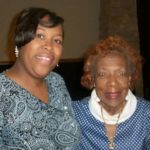 This Act Locally Waco blog post was written by Sophia A. Strother. Sophia is the CEO of Empowerment Driven by Knowledge Coalition & Trustworthy Consulting, a nonprofit community organization she founded. She has a master’s degree in marketing and is a licensed childcare administrator. Strother has endured much in her life—from sexual abuse and drug-addicted parents to being homeless and pregnant at 15. As an adult, Strother has struggled with and overcome her past demons and built a life and career around helping others. She shares her story in her book, “Sophia I’m Back” which is available online at Amazon.com and other channels.
This Act Locally Waco blog post was written by Sophia A. Strother. Sophia is the CEO of Empowerment Driven by Knowledge Coalition & Trustworthy Consulting, a nonprofit community organization she founded. She has a master’s degree in marketing and is a licensed childcare administrator. Strother has endured much in her life—from sexual abuse and drug-addicted parents to being homeless and pregnant at 15. As an adult, Strother has struggled with and overcome her past demons and built a life and career around helping others. She shares her story in her book, “Sophia I’m Back” which is available online at Amazon.com and other channels.
The Act Locally Waco blog publishes posts with a connection to these aspirations for Waco. If you are interested in writing for the Act Locally Waco Blog, please email [email protected] for more information.


